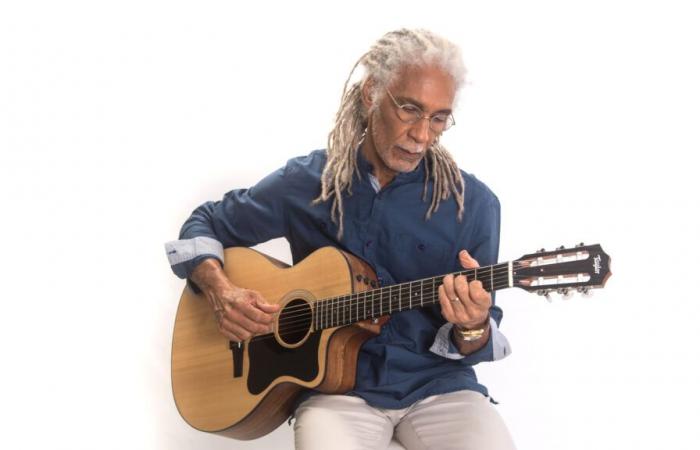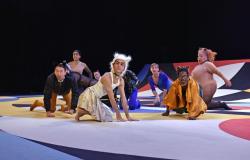He has been composing songs and playing music for over 50 years. And yet, Chris Combette, 67, has only just released his… sixth album. That’s an average of around one album per decade. The singer cannot be alarmed: “Above all, I like going on stage, composing, writing texts… In the end, I release records to continue to exist, to earn Sacem royalties, a bit out of obligation…“, he explains to us with sunny phlegmatism, on the phone, from his little corner of the world, stuck between Suriname and Brazil: French Guiana.
In his speeches and his prosody, the man resembles his music: gentle and committed, cool and swaying, between the whisper and the affirmation, the caress and the raised fist… Since his beginnings, he has forged a Caribbean music, or swing skillfully, on its hand-sewn melodies, reggae sways, ragga assaults, calypso reminiscences, compass winks, salsa spices… In short, a joyful Creolity, like a crossroads, which assumes its sources and its horizons plurals.
Born in Guyana to two Martinican parents – “They met on the boat. My mother left her island and her family to move in with an aunt. My father, who was going to work in the administration, consoled her…” –, he grew up in Le Havre until the age of six, before spending the rest of his childhood in Martinique. Then it was Montpellier, and a job as a math teacher which took him to various academies: Martinique, Guadeloupe, Paris… Finally arises this desire to return to the land of choice and birth.One fine day in 1996, I insulted winter and fled Paris to settle here two weeks later. When I discovered Guyana at 14, I felt love at first sight: the bright red of the earth in contrast with the green of the Amazon forest, the wild and harsh nature, the space… All this breathing!“, he gets excited.
The Maroni refuge
In fact, if its music asserts itself as Caribbean in the broad sense, it nevertheless keeps its roots and its imagination well anchored here in Guyana, as expressed in French in the last song of the record, Maroniwhich compares the river-symbol to the habitat, the haven, the refuge, the country: “This land where the most beautiful dreams in the world plunge, I found hope where my soul is soothed, where my body will forget the fury and its embers/ and I love this country as strong as it is great, I lost my fear and found my rank“, he sings. “I wanted to describe the epic tale and the resistance of the Maroon slaves who fled their conditions on its banks to escape their masters, and their disastrous destiny.“, he said.
He too, moreover, finds answers in his currents: “I do not have a fusional or sacred relationship with the river like these 'water men' who live alongside it on a daily basis.… But I like to go there regularly, set up a cabin, stretch out a hammock to enjoy the freshness and deafening silence of the forest. Last time, I went up so high that I could drink its water. I set up camp. I stayed there three days… Paradise!“
To compose, Combette always starts from music, from a rhythm, from the irresistible force of a melody, to which he hums like yogurt. Before letting yourself be invaded by a theme. “From there, I researched a lot on the subject.“, he explains.
An erudition which explains the thickness of the titles ofSo be it. Recorded in his house in the residential district of Remire-Montjoly, 20 minutes from Cayenne, covered with mattresses for the occasion, to dampen the sound, this album turns out to be as poetic as it is political. Through his tracks, he talks about the prejudices that eat away at a society (So be it), the homesickness of an exiled worker (Long time), fruitful cultural roots (Within reach), the exploitation of the have-nots by the haves (Never leave us alone)… And among this beautiful bouquet of around ten carnal, rooted, Guyanese songs, two are signed by her compatriot Christiane Taubira (Fly Summer, Country rate…). “I feel boundless admiration and tenderness for her. We have, I believe, a warm relationshiphe describes. During a conversation, she admitted to me that she had drawers full of texts (of songs)… She agreed to give me some of them. We made a record together, released late, given his political responsibilities, and remained quite confidential.“
Behind the scenes
Through the songs in Martinican Creole written by Combette and those in Guyanese Creole by Taubira, we can see the behind the scenes, and the scars left by history on this territory: “Guyana is the hell of the penal colony, this land where the waste of French society was sent, this forest where a terrifying bestiary of snakes, spiders, mosquitoes lurks in the collective unconscious.…says the artist. My department does not benefit from the positive aura of the Antilles, with coconut trees and white sand beaches…‘.
However, Combette feels in close solidarity with the current demonstrations in Martinique against the high cost of living…”This subject upsets me. Far from being anecdotal, this 'high cost of living' symbolizes the control of the békés over the entire island society. And I find the sending of the CRS 8 amazing. Despite the immense legitimacy of the struggle, the government does not understand it… he protests. Here, in the end, we come up against the same problems of the high cost of living and the stigma left by the colonial era and slavery. We have shaky infrastructure, a lot of landlocked places, accessible only by canoe, the problems of gold panning which are poisoning the population with mercury. But our main concern, the population's obsession, remains insecurity…“
Despite all these reasons for anger and concern, Combette remains gentle, in his attitude and his creations. And perhaps that’s why it resonates universally… And why even the Japanese love it! The Guyanese has also returned from a tour to the land of the rising sun. He covered one of the hymns of the Japanese Yosakoi dance style, in Creole, Mo sa Yosakoione of the tracks on the disc : “It's the story of a Buddhist monk who buys a comb despite his baldness. After further investigation it turns out that our man has a girlfriendhe explains. When I sang it in Kōchi, the birthplace of Yosakoi, it was euphoria!”
Proof that from his little corner of earth, Chris Combette the Creole, Combette the Guyanese, still speaks to the whole world.
Chris Combette, So be it (Chris Combette) 2024
Instagram / YouTube






